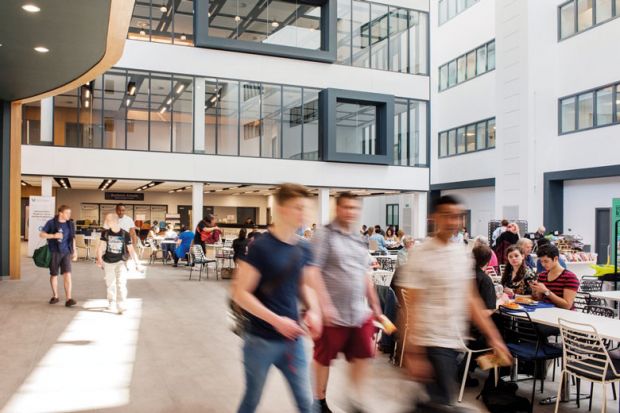The University of West London (UWL) has broken from the rest of the UK sector and promised “no more online learning” when students return in September.
It has become the first institution to make such a bold pledge, with most universities stating that they will keep at least some learning online in autumn 2021.
However, Anthony Woodman, deputy vice-chancellor of the university, told Times Higher Education that the government had “given us the opportunity, should we wish and if we are able to manage, to be able to work on site” – and so the institution would do so.
A THE survey carried out in July found that the majority of universities were planning to have large lectures online, with 61.5 per cent of the institutions surveyed saying they would do so. Of the 35 per cent that said they planned to hold at least some in-person lectures, all also said they had discovered benefits to online offerings throughout the pandemic and would be keeping “some of the best elements” digital.
Although institutions have insisted that such decisions are based on pedagogical reasoning, the plans have not been received well by some elements of government, the press or the public.
Professor Woodman said that “of course” UWL’s learning technology had been enhanced by the switch to online learning at the start of the pandemic, but that it would now remain as “a really good, high-quality, informative, supportive adjunct to that face-to-face teaching”.
He explained that UWL’s decision “is what works for our staff and our student demographics. I would be the last person to turn around and say: ‘If we can do it, why can’t others?’ Each university is different. What works for us might not work for others in the sector.”
It was not helpful when politicians “make blanket statements that online doesn’t work”, continued Professor Woodman, saying that he “doesn’t believe there are any universities not having in-depth discussions about what is best for their students”. UWL made its decision “based on the courses that we offer and the students that choose to study here”, he said.
He pointed out that 67 per cent of UWL students were mature learners and that about 92 per cent could be classed as commuters.
“Demographics make a difference,” Professor Woodman said. “We were very quickly made aware of the complexities of not having a safe, secure, comfortable place with good IT, that many of our students faced.
“One of the biggest things we realised, for example, was that perhaps we had taken for granted before how much the library is a foundation stone to the university and what an important factor it is to students.”
What’s more, he went on, a large proportion of UWL’s subjects were practical based, which required in-person lessons. For this reason, teaching at the university had been largely in-person since the start of 2021, when the government implemented a phased approach to campus returns and practical courses were the first allowed back.
Professor Woodman said that while staff appeared keen to get back to in-person teaching “as the biggest energy is seeing your students thrive and your students succeed”, the leadership team would continue a dialogue with unions and all staff about what they were comfortable with.
The pandemic has “really taught us what being healthy means”, he said. “Ultimately, this also comes down to the mental health of both our staff and our students.”
Register to continue
Why register?
- Registration is free and only takes a moment
- Once registered, you can read 3 articles a month
- Sign up for our newsletter
Subscribe
Or subscribe for unlimited access to:
- Unlimited access to news, views, insights & reviews
- Digital editions
- Digital access to THE’s university and college rankings analysis
Already registered or a current subscriber? Login








